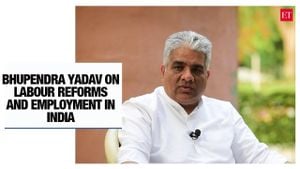The recent landscape of social media is seeing significant shifts as the era of social media 'influencers' faces uncertainty. Reports highlight a noticeable trend where public figures, including celebrities and influencers, are choosing to sever ties with social media platforms. This change indicates a potential decline in the influencer trend that may shape the industry in 2024.
One glaring example is Australian actress Chloé Hayden, who recently announced her departure from Instagram. Her decision stems from the negative impact social media had on her mental and physical health. Hayden, known for her activism around autism and ADHD, detailed the distressing nature of her experiences, sharing that she faced "death threats, detailed suicide prompts and horrific, intricate abuse each and every day" from online trolls. Despite her efforts to raise awareness and relate her own experiences to her 247,000 followers, the toll became too great.
Hayden’s exit is not an isolated case. Earlier in the year, Sydney influencer Emma Claiir chose to delete her Instagram and TikTok accounts, realizing that the relentless online abuse was detracting from her time with her family. Claiir had previously sparked controversy after discussing the accidental death of cats in her youth, which amplified negative responses directed at her. Her story illustrates the weight of public scrutiny influencers endure and the sacrifices they make.
Krystal Hipwell, a former model and participant in the reality television show Big Brother, also exemplifies this trend. She accumulated a substantial following by sharing her experiences as a mother online but ultimately decided to step back to ensure that she could be present for her children. In her last post from December 2021, Hipwell encouraged her audience to prioritize real-life experiences over the curated snapshots often seen on social media. Her heartfelt message resonated with many, as fans expressed their continued hope to hear from her again.
The influence of reality television extends further, with participants from shows like Married at First Sight opting to withdraw from social media entirely. Heidi Latcham and Bronson Norrish, both from season six, have not updated their followers in years, stepping away from potential lucrative brand collaborations to regain control of their personal lives. The upcoming season of MAFS could reveal how many participants will pursue influencer careers or reject the social media spotlight altogether.
As these influencers exit the digital space, it raises questions about the sustainability of the influencer economy that has surged in recent years. An estimated global influencer market worth approximately $13.8 billion in 2021 indicates that content creation remains an alluring career path for many, especially among younger generations. A striking poll from 2019 showed that children preferred the prospect of becoming YouTubers over traditional careers like astronauts. Yet, amid the glitz and glamor of influencer culture, a less discussed reality persists—this profession often comes with precarity, insecurity, and mental health issues.
In their pursuit of adoration and fame, many influencers navigate a world riddled with hazards. Multiple studies, including a report by the UK Parliament’s Digital, Culture, Media and Sport (DCMS) committee, have uncovered alarming statistics about pay disparities within the industry. There are often significant pay gaps based on factors like gender, race, and disability. According to a 2020 study by MSL group, black influencers face a staggering 35% racial pay gap compared to their white counterparts.
The glamorous lifestyle projected by successful influencers obscures the harsh realities that many endure. Content creators can find themselves caught in a cycle of performing for brands while often being under-compensated for their work. Notably, many influencers are self-employed, rendering them without the protections typical of conventional employment — no sick pay, no holiday pay, and inconsistent income contributing to high levels of burnout.
This precarious lifestyle is compounded by the unpredictable algorithms that govern social media visibility. As Kelley Cotter, an expert on social media algorithms, explains, influencers engage in a constant game of visibility. The relentless cycle of producing content, often at the expense of personal lives, mirrors a crucial aspect of digital culture—maintaining a presence online is no longer optional but a survival mechanism. Failure to comply may lead to reduced engagement and irrelevance within the fast-paced environment of social media.
The mental health toll cannot be understated. With social media keeping influencers connected to their audience at all hours, many grapple with the loss of boundaries between work and personal life. The incessant need for online connectivity elevates stress and anxiety levels, contributing to issues like body dysmorphia and eating disorders, as influencers face ongoing evaluations of their appearance by the public.
In light of these challenges, some influencers are advocating for change within the industry. Accounts like the Instagram page Influencer Pay Gap are aiming to shed light on unjust pay disparities and offer a platform for influencers to share their experiences openly. Additionally, awareness around mental health has been growing, prompting discussions on better work conditions and industry regulations.
While the influencer landscape is evolving, the emergence of CGI influencers adds another layer of complexity. Created by tech-savvy teams using computer-generated imagery, these virtual influencers resemble real people but are actually digital constructs with curated online presences. Figures like Lil Miquela have gained notable traction, offering brands a controllable advertising facade that appears human yet is devoid of the complexities tied to actual personalities.
CGI influencers present a paradox; while they provide brands with idealized representations, they also invite scrutiny over authenticity and representation. As influencer culture reflects structural inequalities, the introduction of virtual counterparts raises ethical concerns about representation and ownership. Notably, these artificial representations can perpetuate stereotypes and dilute the narratives of actual marginalized communities.
Despite their integration into the influencer landscape, CGI influencers often escape the rigorous evaluations faced by human influencers. As Francesca Sobande, a digital media studies lecturer, argues, the discussions surrounding transparency within influencer culture often neglect the manufactured nature of CGI influencers. This oversight fosters a false sense of authenticity and further perpetuates the issues of racial inequalities within the industry.
Ultimately, the landscape is changing. With increasing awareness of the negative aspects of social media influence, such as emotional and mental health impacts, alongside ongoing discussions about representation, equity, and authenticity, the future for influencers—both real and virtual—remains uncertain as society navigates this shifting digital ecosystem.



